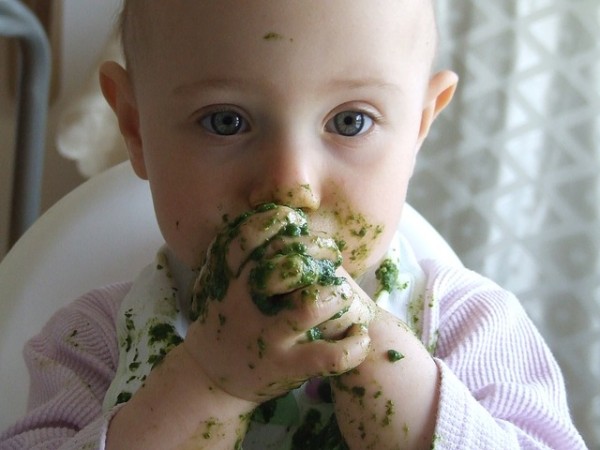
Ajale / Pixabay
Guest post by Amy Baker Joyce, MS, RD, LD, CNSC. Courtesy of the Maine Academy of Nutrition & Dietetics
Times change (and so do health recommendations), but questions from new parents about what and when and how to feed their infants are timeless. Although new science has resulted in several recent updates on infant feeding guidelines, there’s no need to worry — we’ve got answers to your most common infant feeding questions.
When should my baby start on solid foods?
You might be tempted to start your baby on solid food before six months, but resist the urge. Current research shows that they should definitely not be started before four months. The concern is that younger infants may not be developmentally prepared for solid foods. It may also increase the risk of certain chronic diseases.
The American Academy of Pediatrics, the American College of Obstetrics and Gynecology and the American Academy of Family Physicians all recommend holding off until the six-month mark. That’s when babies need additional vital nutrients like iron and zinc.They’re also ready for more texture in their diets at that age.
You should continue to breastfeed (or use formula if breastfeeding is not possible) throughout the baby’s first year.
Are pureed foods still the best first foods?
To be safe, most experts still recommend that the very first texture should be a very thin puree as most babies tolerate this best. After a few successful spoon feedings, you can work up to thicker textures. Newer thinking encourages moving to lumpy food textures sooner rather than later. Babies kept on pureed foods too long can develop feeding problems later.
Do we have to start with rice cereal?
As for what food to start with, single grain infant cereals, which are iron-fortified, are an easy and a nutritious option. Plus, cereals are easy to thin out to various textures (with breastmilk or formula).
However, there is no rule that dictates rice cereal needs to be the first. Some people find pureed vegetables and fruits well-tolerated as first foods, and then they move to more iron-rich selections.
What other iron-rich foods are appropriate once my baby gets the hang of solids?
Here are some ideas for iron-rich foods that have thicker, lumpier textures:
- Cooked minced, mashed or shredded meats
- Cooked mashed egg yolks or soft scrambled eggs
- Cooked mashed beans or lentils
- Iron-fortified cereals prepared with less liquid for a thicker texture
- Also offer soft, cooked mashed vegetables and fruits
I’ve heard the term “baby-led weaning”— what is it?
Baby-Led Weaning (BLW) is an alternative method of introducing complementary foods to infants. Instead of spoon-feeding the infant at six months, the baby is given very soft finger foods as first foods. At the same time, on-demand breastfeeding/formula feeding is continued.
Finger foods for six-month-olds isn’t revolutionary, of course. What is different here is that the child is in charge of feeding himself, using his developing coordination skills. Those skills generally kick in around six to nine months.
Remember, never give your baby foods that are choking hazards, such as hot dogs, whole grapes, raw/hard fruits and vegetables, chunks of peanut butter, etc. Be sure to chat with your pediatrician for advice regarding baby-led weaning if you’re considering this practice.
Should I avoid giving my child potentially allergenic foods like eggs, peanuts and fish?
Although past recommendations were to delay giving your child foods like peanuts, tree nuts, cow’s milk, eggs, fish and shellfish, current scientific evidence suggests that if you delay introducing these foods may actually increase the risk of food allergies.
For example, in this recent study, the early introduction of peanuts to infants at high risk for peanut allergy significantly decreased the development of a peanut allergy.
An exception is if there is a strong family history of food allergies (e.g., a sibling or, at least, one biologic parent). In that case, it may still be prudent to delay that allergenic food. You should definitely talk to your pediatrician or allergist first.
Are any foods still completely off limits?
Yes. Honey should be avoided until an infant is one year old, because of the risk of infant botulism.
Where can I get more information?
The Academy of Nutrition and Dietetics, the American Academy of Pediatrics (AAP) and Health Canada, have consumer resources on breastfeeding and infant feeding.
Thanks for reading this guest post from registered dietitian Amy Baker Joyce. I’m especially interested because I’m going to be a grandmother for the first time this June. That’s right! I sure wish I had someone like Amy by my side to guide my way when my daughters were infants. If you have any nutrition questions you’d like to ask her, let me know and I’ll get the answers for you. Send me an email or ask in the comment box below. ~Diane

Leave A Comment